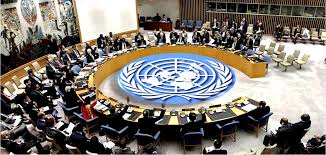Slavery, Human Trafficking ‘Have No Place’ in World Today, Secretary-General Tells Security Council, Detailing Action Needed to End Abuse

Following are UN Secretary‑General António Guterres’ remarks at the Security Council open debate on trafficking in persons in conflict situations, in New York today:
I thank the Security Council under the presidency of Italy for convening today’s open debate on trafficking in persons in conflict situations.
Criminals and terrorists are capitalizing on, and perpetuating, the disorder and mayhem of conflict. To fund their crimes, they prey on the vulnerable. Their brutality knows no bounds: sexual exploitation, forced labour, the removal of bodily organs and slavery are the tools of their trade.
Terrorist groups such as Da’esh, Boko Haram, Al‑Shabaab and the Lord’s Resistance Army are forcing women, boys and girls into de-humanizing servitude. Committed in the shadows, these actions are serious abuses of human rights, and may amount to war crimes and crimes against humanity. In recent days, we have all been horrified by images of African migrants being sold as “goods” in Libya.
It is our collective responsibility to stop these crimes. We must act urgently to protect the human rights and dignity of migrant populations. That means bringing the perpetrators to justice. It means immediately increasing humanitarian aid. And it means helping the Libyan authorities to strengthen their own capacity to protect and provide for vulnerable men, women and children.
But there is also an urgent need to create more opportunities for regular migration, to restore the integrity of the refugee protection regime, and to increase the number of refugees resettled in the developed world.
Slavery and other such egregious abuses of human rights have no place in the twenty‑first century. According to the Global Report on Trafficking in Persons issued by the United Nations Office on Drugs and Crime (UNODC), increasing numbers of victims trafficked from Iraq, Syria and Somalia are appearing in Asia, Europe and the Middle East.
The Security Council has taken important steps against trafficking, including by unanimously adopting resolution 2331 (2016) last December and the resolution to be adopted this morning. These texts call for the targeting of financial flows to traffickers. They urge every nation to adopt and implement the United Nations Convention against Transnational Organized Crime and its protocol on trafficking in persons.
Along with the Political Declaration on the implementation of the Global Plan of Action, which was affirmed by every nation in September of this year, we have built a framework for action rooted in international law. Cooperation, mutual legal assistance and information-sharing are the mainstays of our activities.
You have before you my first report on the implementation of Resolution 2331, which documents the ongoing work of Member States and many parts of the United Nations system. These efforts need to be intensified. We must make full use of the data collection, analysis, tools and technical assistance provided by UNODC and other United Nations actors, particularly those operating in conflict and post‑conflict situations.
Better understanding of human trafficking markets and routes will strengthen analysis and prevention. And coordination will be crucial, including through the Inter-Agency Coordination Group against Trafficking in Persons.
Trafficking is also a development issue. Preventing the situations that lead to trafficking means addressing poverty and exclusion in line with the 2030 Agenda for Sustainable Development. We must also do more to support the victims and survivors of trafficking. Indeed, they should be treated as victims of crime and not detained, prosecuted or punished for unlawful activities they were compelled to engage in, in order to survive.
I also urge Governments, the private sector and civil society to support the Blue Heart Campaign and the United Nations Voluntary Trust Fund for Victims of Trafficking in Persons, Especially Women and Children.
The international community’s commitment is being tested. We need to show the world our determination to end human trafficking, help its many victims and hold those responsible accountable for their crimes.
Source: https://reliefweb.int/report/libya/slavery-human-trafficking-have-no-place-world-today-secretary-general-tells-security
